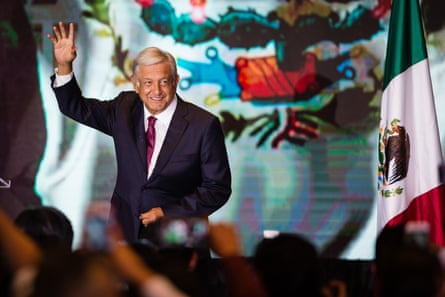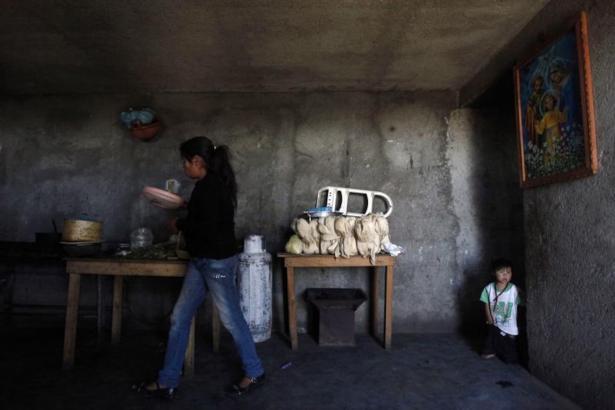‘Historic’: How Mexico’s Welfare Policies Helped 13.4 Million People out of Poverty
Toothless and frail, Gloria Palacios, 84, stooped as she set up her rickety sidewalk shop in Mexico City’s roughshod Doctores neighborhood. On sale: peanuts, cigarettes, chewing gum, chocolates and chips.
When asked how much she made in a day, Palacios’s disabled son Gustavo, who helps run the tiny store, simply laughed. “If we make 100 pesos ($5) it’s a lot,” he said. Happily, said Palacios, the family has a different lifeline.
With their house crumbling and bills piling up, the only thing keeping them afloat is a bimonthly transfer of 6,200 pesos ($330) implemented by the government of previous president Andrés Manuel López Obrador for adults over 65.
“God bless López Obrador,” said Palacios. “Without him what would we do? I think we wouldn’t even have enough to eat.”
Palacios is one of millions of people across Mexico who have benefited from the welfare policies of López Obrador, or Amlo as he’s commonly known. And now, thanks to a report released last week by the country’s national statistics agency, we know just how effective those policies were.
When Amlo took office in 2018, there were nearly 52 million people living below the poverty line: by the time he left office six years later, that number had dropped by 13.4 million, a decrease of almost 26%. Extreme poverty also dropped from nearly 9 million people to just 7 million.
In a country that has long suffered from deep inequality and struggled with economic precarity, the steep drop in the number of people living in poverty is a remarkable achievement and suggests Amlo’s policies had a measurable impact on the lives of millions of everyday Mexicans.
“It’s something extraordinary, historic, the reduction [of poverty],” said Amlo’s successor and ally Claudia Sheinbaum during a news conference on Thursday. “‘For the good of all – first the poor’ is not just a slogan, but a reality in Mexico.”
Some independent Mexican analysts have been equally enthusiastic about the poverty reductions achieved under Amlo.

Andrés Manuel López Obrador salutes attendants after his victory in the elections for the presidency of Mexico on 1 July 2018 in Mexico City. Photograph: Manuel Velasquez/Getty Images
“There has never been a single six-year term in which poverty has been reduced or decreased so significantly,” said Viri Ríos, a public policy expert and director of Mexico Decoded. “This is a watershed moment for the Mexican economy.”
Amlo was elected in a 2018 landslide with a promise to eradicate corruption and tackle inequality. Among the legacies of his administration were the tripling of the minimum wage from 88.40 pesos ($4.75) per day when he took office to the current rate of 278.80 pesos ($15) a day.
This had a knock-on effect on other sectors of the economy, according to Valeria Moy, a Mexican economist and director general of IMCO, a public policy thinktank.
“When the minimum wage increases, other wages and incomes in the economy begin to rise – even in the informal economy – because there is a greater availability of resources,” she said. “I don’t know if the [poverty reduction] was purely because of López Obrador’s policies, but I do think the push in the minimum wage moved the rest.”
Ríos was more emphatic.
“We’re talking about a labor market that had a minimum wage well below the standard of living,” she said. “And now it’s reached a level that allows 13.4 million families to escape poverty. It’s a historic achievement.”
Amlo also transformed the social welfare system, implementing a system of cash transfers for elderly people, like Palacios, for young people doing apprenticeships and for farmers planting fruit trees, among others. He then doubled the amount spent on these transfers.
The universal cash transfer system, which replaced a well-regarded conditional system for the poorest fifth of households requiring children to go to school and families to attend health check-ups, has received some criticism as it meant that, in the case of the pension system for example, anyone, even well-off Mexicans over 65, were entitled to a transfer.
“We lost focus and lost the ability to give to the poorest,” said Gonzalo Hernández Licona, the former head of the National Council for the Evaluation of Social Development Policy (CONEVAL), a now defunct agency which used to measure poverty before the task was transferred to the statistics institute. “While the amount has grown, the way the amount is distributed has worsened.”
This might help explain why the 19% reduction in extreme poverty was much lower than the nearly 26% reduction in overall poverty. Many of the poorest Mexicans live in remote rural places, where accessing social welfare is hard if not impossible.
“The big problem [with the cash transfers] is not that they’re universal,” said Ríos. “The big problem is that the Mexican government has not made an effort to make it truly universal – that is, to make it reach everyone.”
Meanwhile, the report from the statistics agency also revealed other glaring issues under Amlo’s government: while access to food security, social security and dignified living conditions all increased, the number of people without access to health services more than doubled, from 20.1 million people in 2018 to more than 44 million in 2024.
“I think the great debt that the Mexican state still owes its people is improving access to healthcare,” said Ríos. “As a percentage of GDP, our spending on health is similar to countries in sub-Saharan Africa.”
Palacios, who has considerable medical expenses but no access to medical insurance said she felt “horrible”.
“Medicines are so expensive,” she said. “And I don’t have anything.”
Sheinbaum admitted there was still more work to do.
“Do we still have progress to make? Yes,” she said. “With 30% of Mexico’s population living in poverty, we obviously have to keep moving forward.”
Oscar Lopez is a freelance journalist based in Mexico


Spread the word